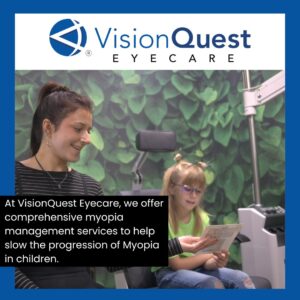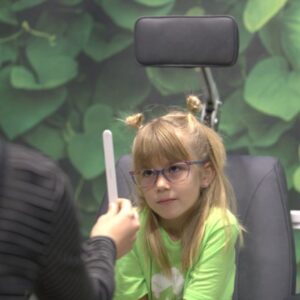Myopia, or nearsightedness, is a common vision condition that causes distant objects to appear blurry while close objects remain clear. It’s increasingly prevalent among children, with studies showing a significant rise in cases over recent decades. Managing and slowing the progression of myopia in children is crucial, as severe myopia can lead to serious eye health issues later in life, such as retinal detachment, glaucoma, and cataracts.
At VisionQuest Eyecare, we offer comprehensive myopia management services to help slow the progression of this condition in children. Here are several effective strategies and treatments that can help manage myopia in your child.
Understanding Myopia
Before diving into the solutions, it’s essential to understand what causes myopia. Myopia occurs when the eye grows too long from front to back, or the cornea (the clear front cover of the eye) is too curved. This causes light entering the eye to focus in front of the retina instead of directly on it, resulting in blurred distance vision.
Several factors contribute to the development and progression of myopia, including genetics, excessive near work (such as reading and screen time), and limited time spent outdoors.
Strategies to Slow Myopia Progression
1. Regular Eye Exams
Routine eye exams are critical for early detection and management of myopia. At VisionQuest Eyecare, we recommend that children have their first comprehensive eye exam at six months old, followed by exams at three years old and before starting school. Annual exams are essential for school-aged children, especially if there is a family history of myopia.
2. Spending Time Outdoors
Research has shown that spending more time outdoors can help reduce the risk of developing myopia and slow its progression in children. Natural light exposure and looking at distant objects can be beneficial for eye health. Encourage your child to play outside for at least 60 minutes a day.
3. Reducing Screen Time and Near Work
Excessive screen time and prolonged near work are significant risk factors for myopia progression. It’s crucial to limit the time your child spends on digital devices and ensure they take regular breaks using the 20-20-20 rule: every 20 minutes, look at something 20 feet away for at least 20 seconds. This helps reduce eye strain and allows the eyes to relax.
4. Orthokeratology (Ortho-K)
Ortho-K is a non-surgical treatment involving specially designed contact lenses that temporarily reshape the cornea to improve vision. Children wear these lenses overnight, and they can slow the progression of myopia by reducing the elongation of the eye. VisionQuest Eyecare offers Ortho-K as an effective myopia management option.
5. Multifocal Contact Lenses
Multifocal contact lenses, typically used to correct presbyopia in adults, have been found to slow myopia progression in children. These lenses provide different lens powers for near, intermediate, and distance vision, helping to control the eye’s focus and slow myopia development. Our optometrists can fit your child with these specialized lenses if they are a suitable candidate.
6. Atropine Eye Drops
Low-dose atropine eye drops have been shown to effectively slow the progression of myopia in children. These drops work by dilating the pupil and relaxing the eye’s focusing mechanism, which helps control the elongation of the eyeball. VisionQuest Eyecare provides atropine treatment as part of our myopia management program.
Importance of a Holistic Approach
A comprehensive and individualized approach is essential for effectively managing myopia in children. Combining multiple strategies, such as lifestyle changes, optical treatments, and regular monitoring, can provide the best outcomes.
1. Customized Treatment Plans
At VisionQuest Eyecare, we understand that every child is unique, and so are their myopia management needs. Our optometrists work closely with parents and children to develop customized treatment plans that address their specific conditions and lifestyle factors. Regular follow-ups and adjustments to the treatment plan ensure optimal results.
2. Parental Involvement
Parental involvement is crucial in managing myopia in children. Parents should encourage outdoor activities, monitor screen time, and ensure adherence to prescribed treatments. Educating parents about myopia and its potential risks helps them make informed decisions about their child’s eye health.
3. Education and Awareness
Raising awareness about myopia and its management is essential for preventing its progression. VisionQuest Eyecare provides educational resources and conducts community outreach programs to inform parents, teachers, and children about the importance of eye health and myopia management.
Slowing the Progression of Myopia
Myopia in children is a growing concern, but with proactive management and the right strategies, its progression can be slowed significantly. At VisionQuest Eyecare, we are committed to providing comprehensive myopia management services to protect your child’s vision and overall eye health. From regular eye exams and lifestyle recommendations to advanced treatments like Ortho-K and atropine eye drops, our optometrists are dedicated to finding the best solutions for your child’s needs.
If you have concerns about your child’s vision or would like to learn more about our myopia management services, please schedule an appointment with VisionQuest Eyecare today. Together, we can help ensure a brighter, clearer future for your child’s eyes.

Dr. Chris Browning is a Greenwood native, who has been serving the community through glaucoma care and myopia management. He studied at Indiana University Bloomington and the Indiana University School of Optometry. As he has severe nearsightedness himself, Dr. Browning is passionate about helping others to achieve excellent vision.



